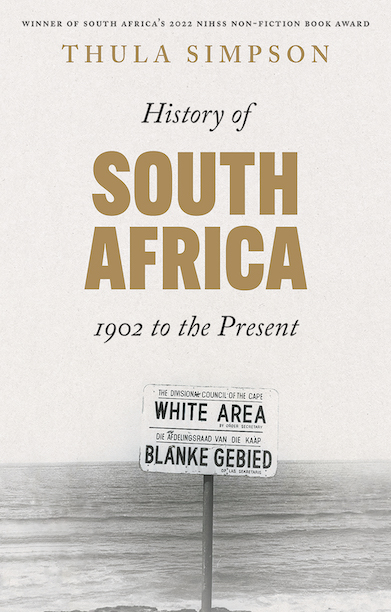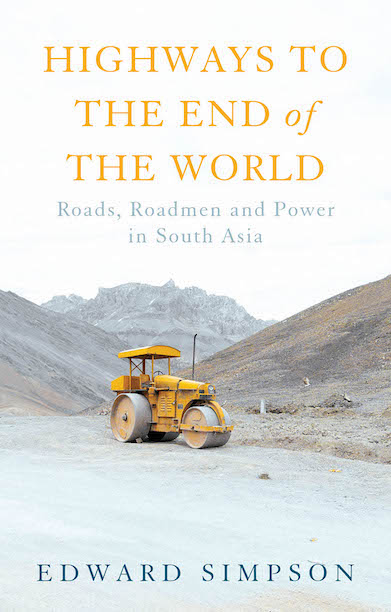History of South Africa
1902 to the Present
Winner of the National Institute for the Humanities and Social Sciences Non-Fiction Book Award (South Africa)
A fascinating account of South Africa’s 120-year journey through war, crisis and division, which now looks set to come full circle.
Description
South Africa was born in war, has been cursed by crises and ruptures, and today stands on a precipice once again. This book explores the country’s tumultuous journey from the Second Anglo-Boer War to 2021. Drawing on diaries, letters, oral testimony and diplomatic reports, Thula Simpson follows the South African people through the battles, elections, repression, resistance, strikes, insurrections, massacres, crashes and epidemics that have shaped the nation.
Tracking South Africa’s path from colony to Union and from apartheid to democracy, Simpson documents the influence of key figures including Jan Smuts, Nelson Mandela, Steve Biko, P.W. Botha, Thabo Mbeki and Cyril Ramaphosa. He offers detailed accounts of watershed events like the 1922 Rand Revolt, the Defiance Campaign, Sharpeville, the Soweto uprising and the Marikana massacre. He sheds light on the roles of Gandhi, Churchill, Castro and Thatcher, and explores the impact of the World Wars, the armed struggle and the Border War. Simpson’s history charts the post-apartheid transition and the phases of ANC rule, from Rainbow Nation to transformation; state capture to ‘New Dawn’. Along the way, it reveals the divisions and solidarities of sport; the nation’s economic travails; and painful pandemics, from the Spanish flu to AIDS and Covid-19.
Reviews
‘A remarkable historian whose work on South African history deserves to be read.’ — History Today
‘The impressive scale of the work, and its reach into the present, make it uniquely valuable for anyone wanting an overview of how South African history is understood by dominant opinion.’ — Foreign Policy
‘Simpson finely traces the political history of South Africa since the beginning of the twentieth century … Armed with fascinating details and anecdotes, he focuses on its contentious politics, from labor strife in the first half of the century to the harshly repressed protests against the apartheid government in the latter half of the twentieth century.’ — Foreign Affairs
‘Narrative history at its best. With prodigious detail and eloquent prose, Thula Simpson places Black South Africans at the centre of the country’s historical evolution and claims his place at the head table of contemporary historians. A masterpiece!’ — Xolela Mangcu, former Oppenheimer fellow, Hutchins Center for African and African American Studies, Harvard University, and author of Biko: A Life
‘In this pacy and compelling political history of South Africa, Simpson draws on fresh sources to extend the arc of apartheid and resistance into the current moment. By doing so, he skilfully illuminates the country’s current predicament.’ — Saul Dubow, Smuts Professor of Commonwealth History, University of Oxford
‘This book is history writing at its best.’ — Lindie Koorts, author of DF Malan and the Rise of Afrikaner Nationalism
‘Covering the period from the aftermath of the South African War to the present, this is the first comprehensive history of South Africa to come out since those surrounding the achievement of democracy and is long overdue. A very readable and invaluable resource for general readers, students and academics.’ — Alan Kirkaldy, Head of History, Rhodes University
‘Thula Simpson charts key episodes in South African history with a powerful narrative and illuminating detail. His attention to sources and to the role of individuals makes this a valuable reference and teaching text.’ — William Beinart, Emeritus Professor, African Studies Centre, University of Oxford
‘Two themes stand out in this industriously researched history of modern South Africa. One is the extent to which South African political and social life has been shaped by organised political violence. The second is the persistence of extreme forms of inequality between South Africans, both in terms of power and with respect to livelihoods. These tragic features of the national story continue to shape South African life. For anyone interested in why we are where we are today, this engaging and illuminating book will offer powerful insights.’ — Tom Lodge, Emeritus Professor of Peace and Conflict Studies, University of Limerick, and author of Politics in South Africa: From Mandela to Mbeki
Author(s)

Thula Simpson is Associate Professor of History at the University of Pretoria. A British scholar, he obtained his PhD at Birkbeck, University of London. He is the author of the acclaimed Umkhonto we Sizwe: The ANC’s Armed Struggle.



